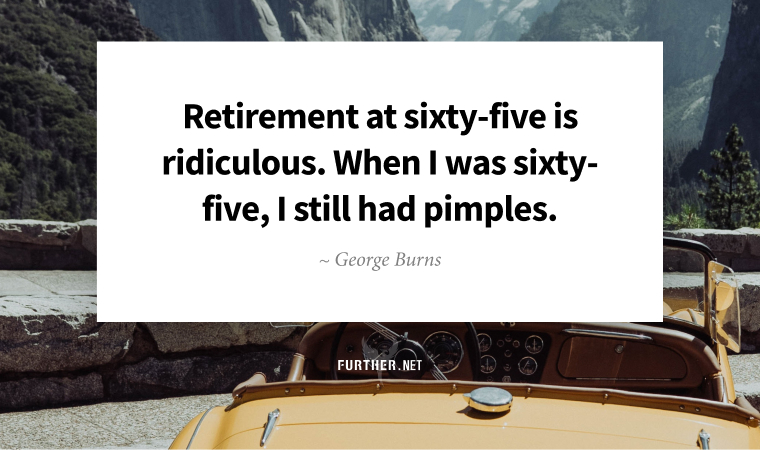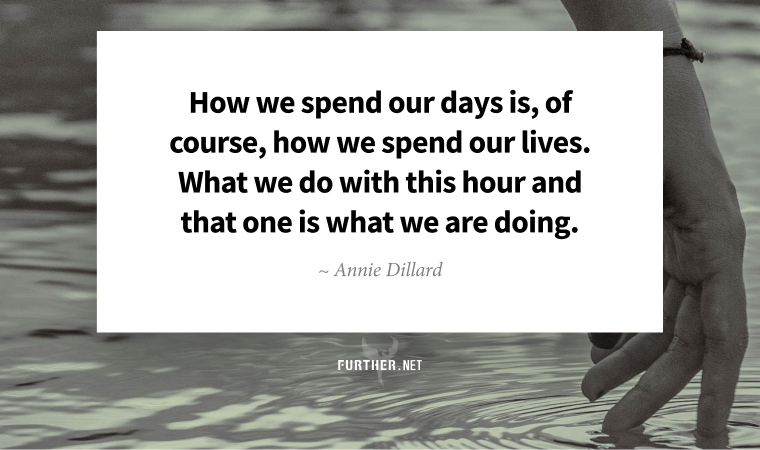How to Change Your Mind About Retirement 
If you read the headlines, you might believe our generation is doomed to a grim future. Just Google "Gen X," and let the barrage begin with articles like: Will anyone ever cut us some slack? The answer, as we latchkey types well know, is no. And even if you instinctively understand that the real retirement crisis is about losing meaning and purpose when you stop working, there's also a feeling that you'll never catch a break. The old "I'll sleep when I'm dead" adage loses its sparkle when it feels like a threat, not a party-goer's promise. Speaking of words to live by, here's all you need to do when considering your future: don't believe the hype. The good news is that there are scientifically proven ways to stop outdated beliefs and dire predictions from coloring your vision. New research from psychologists Adam Mastroianni and Daniel Gilbert shows there's a "bug," or set of cognitive biases, that makes people think things today are way worse than ever before. The two primary biases are: - Biased exposure: Our tendency to focus on negative information (which is why fear-inducing headlines work)
- Biased memory: Our tendency to hold onto positive vs. negative thoughts from the past
Put it all together, and it seems like your experience today and in the future will never match the "good old days." We may know the truth about retirement — that the concept was fabricated simultaneously with Social Security in 1935, essentially to push older people out of the labor market — but our biases make us feel like we're being robbed if we're not sipping a frozen cocktail on a beach at 65 on the dot. Scientist and cognitive philosopher Andy Clark, author of the new book, The Experience Machine: How Our Minds Predict and Shape Reality, goes beyond the biases and asserts that the human brain is a "prediction machine" that relies on the past to conjure our current and future realities. We are never simply seeing what's 'really there,' stripped bare of our own anticipations or insulated from our own past experiences. Instead, all human experience is part phantom — the product of deep-set predictions. These "hidden predictions" are affected by all sorts of psychological conditions: moods, emotions, mental disorders (i.e., anxiety, depression), and fatigue, among others. This can make us more susceptible to awful manipulations by media companies and others who use fear and negative emotions to provoke action. Here's a great example of how this works: Can you guess what misstep this headline is referring to: The No. 1 Mistake That Leads To Cognitive Decline, From A Memory Coach? Clearly, it's something horrendous, yet a common mistake most of us make. Spoiler alert: the answer is retirement. So, what is it? Is retirement something we all want, but will never attain, or something we'll attain but don't really want? The answer is something that will work for you that isn't a rigid tradeoff between productivity and leisure. And it'll be something you create for yourself by staying vigilant, as Clark explains: Human minds are not elusive, ghostly inner things. They are seething, swirling oceans of prediction, continuously orchestrated by brain, body, and world. We should be careful what kinds of material, digital, and social worlds we build, because in building those worlds we are building our own minds too. Cut yourself some slack by working on retiring your biases and relaxing your conscious and unconscious predictions. That's the best way to change your perspective of retirement and envision a productive, prosperous, pleasurable life in your later years. Further exploration: The Experience Machine: How Our Minds Predict and Shape Reality (Amazon) The Experience Machine: Cognitive Philosopher Andy Clark on the Power of Expectation and How the Mind Renders Reality (The Marginalian) Your Brain Has Tricked You Into Thinking Everything Is Worse (New York Times) Down below, our guest contributor Tom Bentley offers another solution to the human condition: unleash your inner robot to keep your body healthy, productivity consistent, and mind content. Keep going – Trudi Roth P.S. New to Further? Join us here. You Heard That Right All those years of cranking your Walkman and sitting under speakers at concerts may be taking their toll on your hearing. Don't just chalk up hearing loss as a normal part of middle age, as science shows auditory challenges may be linked to dementia. Go see an audiologist and listen to what they have to say. Having Trouble Hearing? It May Be A Sign Of Dementia Later In Life (MindBodyGreen) Money Talks If we learned nothing from Succession's Roy family, it's that it's never too soon to talk candidly with your kids about your wishes for your estate, including the whys behind the choices you've made. This might feel difficult, but it's the smartest investment you can make in ensuring a more harmonious future for your family. Talk to Your Kids About Your Estate Plan Now (and How to Do It) (Lifehacker) Sick Progress If you're sick of all the bad news, give yourself a shot of hope by recognizing we're in "a golden age for new treatments." From the rapid development of Covid vaccines to new trials for cancer with "unheard-of" survival rates, leading scientists like Nobel laureate Jennifer Doudna and Donna Shalala, President Clinton's Secretary for Health and Human Services, are proclaiming that we're on the verge of making a longer, healthier life not just a medical miracle — but an inevitability. Suddenly, It Looks Like We're in a Golden Age for Medicine (New York Times) Popeye (and Your Mom) Knew Best Maybe you've heard that antioxidants ("flavonols") are good for your health. A new study conducted over seven years shows that produce containing a specific kind of flavonol called kaempferol offers the highest protection for your brain, keeping you sharper longer and reminding you that your mom's advice to eat your greens is, well, evergreen. These Fruits And Veg Reduce Cognitive Decline Risk The Most (PsyBlog) The Robot Way to Productivity and Good Health 
By Tom Bentley I am a robot. Step near me, and you won't hear gears whirring, and my tumbledown face bears no resemblance to today's beauty bots, but know me by my robot ways: - Wake workdays at 5:45 am, summoned by the automatic coffee beans grinding
- Meditate for 20 minutes, bathing my positronic matrix in alpha waves
- Duolingo for 15 minutes to practice Spanish (years of this, yet mucho más para aprender)
- Writing tasks until 11:30, then 30-45 minutes of exercise.
- 20-minute post-lunch nap in the cocoon of my vintage Airstream office. Even robots need downtime.
- A soft alarm halts afternoon writing tasks at 4:15 — read for 1/2 hour
- Another clock tingle; record a few sentences of gratitude at 4:45
- At 5:00 pm, exercise with light weights and stretch bands; 20–30 minutes
The Robot Routine Has Round Corners I do these things because, you know: robot. But another trick of robots: if the routine is fugged up, we reboot. Start over. Robots, despite our cladded wiring, are flexible. (And after fug-ups, we always remember to breathe.) But on weekends, even robots release their 1s and 0s. The weekends allow for cocktails and desserts because robots need chocolate like bees need honey. Those privations during the work week? They build a sweet — literally — anticipation for the cheatin' weekend. Another fact contradictory to robotic reputation: robots love to daydream. This one muses on his mom's chocolate chip cookies, the dizzying undersea carnivals of color snorkeling in Micronesia, the first thing he shoplifted. Order Is Freedom The robot's life is one of those lovely contradictions: even though it sounds like something from Brave New World, order is freedom. Remember, Flaubert said: Be regular and orderly in your life, so that you may be violent and original in your work. Gustave meant violence of the imagination, those electric sheep that androids dream of. Within boundaries' constraints, the fence lines give you a playground, but with maps. "Do not go past this fence" signs tell you that "Write a 900-word essay" is a stimulant to purpose on the page. Often, surprising rewards. I practice some version of the Pomodoro technique of stretches of focused work followed by breaks. During breaks, I look out my Airstream window or step outside to the surrounding fields. Many times, I've seen bobcats, wild turkeys, deer, and rabbits. There was a beautiful kestrel who hung around for a while, a great horned owl that sadly died in the neighbor's field. Rhododendron, lilac, and jasmine blossoms. It's a secret, but robots like being surprised and are renewed by nature. Release your inner robot, and you'll know. The robot's life seems tight, but it's looser than you'd think. Stop by on a Friday, and I'll make you a Sazerac that will tingle your batteries. Perfectly proportioned, of course. Tom Bentley's latest book is Sticky Fingers, Confessions of a Marginally Repentant Shoplifter. You can see all his lurid website confessions at www.tombentley.com further: flashback  Big Country - In A Big Country
The Crossing, 1983 "What's in the box?" No, this is not a Brad Pitt quote from the film Seven. It's the MacGuffin at the center of the silly video for the awesome song In a Big Country from the Scottish band Big Country. So cool that they tuned the guitars to sound like bagpipes. (YouTube)
further: sharing  Share Further with Friends and Get Access to Well + Wealthy! Share Further with friends and earn three months of access to our membership community: Well + Wealthy with only five referrals. Simply give them your unique referral link or use one of the sharing icons below. You have referred 0 people so far. | Thank you for sharing Further! | 











No comments:
Post a Comment